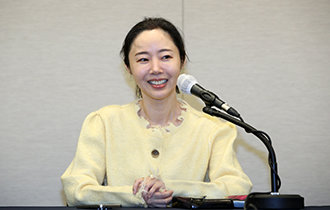Park Jae-seung Leads Reform in UDP Nomination
Park Jae-seung Leads Reform in UDP Nomination
Posted March. 10, 2008 03:00,
Park Jae-seung, chairman of the main opposition United Democratic Partys screening committee, wiped off his tears twice during an hour-long interview with The Dong-A Ilbo held on March 9 at UDPs headquarters in Yeongdeungpo-gu, Seoul. His eyes filled with tears when he started talking about a lesson from his mother who passed away in the 1990s. He said she had told him to always fear what others will say about his performance. Tears were the last thing expected from a man who seems to have firm resolve in abolishing outdated practices in Koreas political landscape.
Not surprisingly, he soon calmed himself down and emphasized that further actions regarding the screening process should adhere to the partys regulations. At the March 7 decision of the UDP Supreme Council to delay the first announcement of the screening results, Park simply said, The council should confirm the findings of the committee just as it is because that is what it is supposed to do according to the partys regulations.
He added, An agreement between the partys leader and the chairman of the screening committee is required for confirming both the nomination of proportional representatives and strategic nomination in the metropolitan area. In other words, candidates will be finalized only when Park reaches an agreement (not consultation) with UDP Co-chairmen Sohn Hak-kyu and Park Sang-cheon.
― The UDPs Supreme Council delayed the first announcement of the screening results on March 7. It complains that the results contained just the names of the nominees.
The results listed names of the nominees of 62 districts with single candidacy. Therefore, the results were rather expected. I dont think they found any problems in the results submitted by the committee. Rather, the Supreme Council probably decided that announcing the results later would give the party a strategic advantage ahead of the elections.
― The council also raised questions over the fact that only you, among 12 screening committee members, had access to the results of opinion polls conducted on lawmakers.
That was for security reasons. Although I was the only one who was able to see the opinion poll results, the figures somehow leaked and are already creating confusion. I can share it with the partys leaders if they want, but it may worsen the current chaos.
― You made it clear that 11 candidates who had the history of being sentenced to imprisonment or heavier punishment would be excluded from the nomination. However, one of them thought the decision was unfair.
(After mentioning the name of the person in question) Of course, he may feel victimized. But to the eyes of the voters, he is not any different from the rest.
Park requested anonymity of the person since he may ask for a reexamination based on what Park said in the interview.
― Some of the 11 candidates who were excluded did request a re-screening.
They came up with an excuse that their positions gave them no other choice but to make the wrong decision. I cannot agree to this because lawmakers should be responsible for their actions as leaders of the society. They cannot relegate the blame to his subordinates, and must remember that they are the ones in charge. Some members of the party wanted to spare them, but I am absolutely against that. The number of people sympathizing with the 11 is also on the decline.
― Excluding inadequate politicians from nomination is important. However, equally crucial is finding new faces of the future UDP.
The partys failure in the presidential election shows that people have lost faith in us. The nomination application is over, so there is limit in increasing the number of new faces all of a sudden. But I heard that the party has been securing some promising applicants. I have also seen some applicants who had attractive qualities during the screening interviews. However, their chances of winning in the elections are low. So we have a combination of some new faces and existing members who had built good reputation.
At this point, Park brought up Greshams law: Bad money drives out good. He said, I dont understand why politicians have the tendency to show their worst during election periods. They physically fight and verbally abuse each other. My friends and I recalled Greshams law because old politicians may act this way just for the sake of blocking the entrance of new politicians.
― Have you ever been offered an official position in politics?
When former President Kim Dae-jung was leading the opposition Democratic Party, I was proposed to run for parliament seat in my district. I rejected the offer because I was happily working as a lawyer.
― It has already been a fortnight since you began conducting the screening process. How do you stay fit when you have no days off?
I began jogging somewhat incidentally in 2001 and have continued doing so ever since. I also jogged for an hour this morning. I completed a full marathon course in four hours and 25 minutes in the Dong-A International Marathon Race in the spring of 2002. Running gives me the time to think about my mother and I could talk to her in my head. So marathon to me is a mother-ton.
― How did your mother influence your life?
When the Dong-A Ilbo asked this question at the beginning of the interview, he was unable to hold back his feelings. In the end, he changed the topic, saying, Lets get back to that later. At the end of the interview when he was asked the same question, he just managed to say a few words amid tears.
She told me to always think about what others will say about my performance. Her words ring often in my ears during the screening process.
srkim@donga.com koh@donga.com






